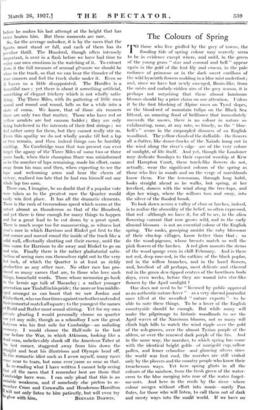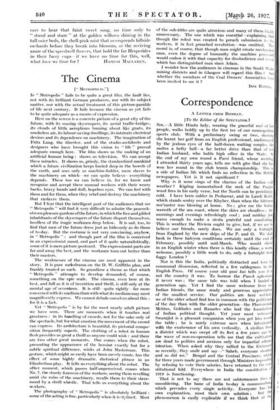The Colours of Spring
TO those who live girdled by the grey of towns, the flooding tide of spring colour may scarcely seem to be in evidence except where, and until, in the green of the young grass " star and coronal and ben " appear again in the gold of the lent lily and crocus, in the pale radiance of primrose or in the dark sweet carillons of the wild hyacinth flowers nodding in a blue mist underfoot; and, since we have but newly emerged, Bruin-like, from the mists and malady-ridden airs of the grey season, it is perhaps not surprising that these almost luminous blooms should lay a prior claim on our attention. Unless it be the first blushing of Alpine roses on Tyrol slope's, or the blood-red of mountain tulips on the Black Sea littoral, an amazing flood of brilliance that immediately succeeds the snows, there is no colour in nature so exhilarating, none, at any rate, so timely, as the " blue- bell's " azure in the empurpled dimness of an English woodland. The yellow clouds of the daffodils-- -the flowers all a-flutter, like dance-frocks of the Naiads hung out in the wind along the river's edge--arc of the Very colour of sunlight, of life itself. And yet, though the Londoner may dedicate Sundays to their especial worship at Kew and Hampton Court, these torch-like flowers do not, actually, wear the significant colours of the spring as those who live in woods and on the verge of marshlands know them. For the townsman, through long habit, looks straight ahead' as he walks, but spring, at her loveliest, dances with the wind along the tree-tops, and dips her wings, where the willows toss and sway, into the silver of the flooded brook.
To look down across a valley of elms or larches, indeed, is to realize the absurdity of the belief, so often expressed, that red—although we have it, for all to see, in the alien flowering currant that now grows wild, and in the early almond blossom—is not an essential colour of the English spring. The rooks, gossiping amidst the ruby blossoms of their elm-top villages, know better than that ; so do the wood-pigeons, whose breasts match so well the pink flowers of the larches. A red glow mounts the stems of the wood spurge even in chill February. And is there not red, deep rose-red, in the catkins of the black poplar, red in the willow branches, and in the hazel flowers, and, loveliest of all perhaps, most delicate and ethereal red in the green dew-tipped centres of the hawthorn buds days, even weeks, before they arc wooed into star-like flowers by the April sunlight ?
One does not need to be " licensed by public approval as an authentic nature-lover "--as a very shrewd journalist once tilted at the so-called " nature experts "—to be able to note these things. To be a lover of the English countryside should be enough. But while many will make the pilgrimage to historic woodlands to see the April waves of the Narcissus blooms, not so many will climb high hills to watch the wind ripple over the gold of the ash-groves, over the almost Tyrian purple of the alders, or over the renewed dark purple of the firs. And in the same way, the marshes, to which spring has come with the identical bright golds—of marigold cup, sallow pollen, and lesser celandine —and glancing silvers since the world was first cool, the marshes arc still visited only by the plovers and the country people who know their treacherous ways. Yet here spring glints in all the colours of the rainbow, from the fresh green of the water- cress to the bhie merging into rose of the water forget- me=nots. And here in the reeds - by the river—where colour merges without effort into tnusic—surely Pan flutes, for those who will listen, to call them out of dark and musty' ways into the sunlit. world. If we have no ears to hear that faint sweet song, no time only to " stand and stare " at the golden willows shining in the tall osier beds, the shell-pink mist that overspreads hillside orchards before they break into blossom, or the reviving azure of the speedwell flowers, that hold the far Hesperides in their faery cups--if we have no time for this, well,























































 Previous page
Previous page